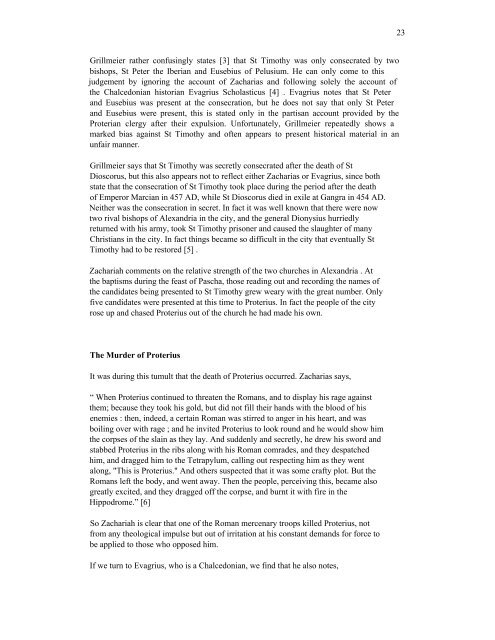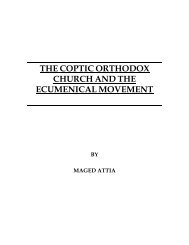Coptic interpretations of the Fourth Ecumenical Council - Saint Mina ...
Coptic interpretations of the Fourth Ecumenical Council - Saint Mina ...
Coptic interpretations of the Fourth Ecumenical Council - Saint Mina ...
You also want an ePaper? Increase the reach of your titles
YUMPU automatically turns print PDFs into web optimized ePapers that Google loves.
Grillmeier ra<strong>the</strong>r confusingly states [3] that St Timothy was only consecrated by two<br />
bishops, St Peter <strong>the</strong> Iberian and Eusebius <strong>of</strong> Pelusium. He can only come to this<br />
judgement by ignoring <strong>the</strong> account <strong>of</strong> Zacharias and following solely <strong>the</strong> account <strong>of</strong><br />
<strong>the</strong> Chalcedonian historian Evagrius Scholasticus [4] . Evagrius notes that St Peter<br />
and Eusebius was present at <strong>the</strong> consecration, but he does not say that only St Peter<br />
and Eusebius were present, this is stated only in <strong>the</strong> partisan account provided by <strong>the</strong><br />
Proterian clergy after <strong>the</strong>ir expulsion. Unfortunately, Grillmeier repeatedly shows a<br />
marked bias against St Timothy and <strong>of</strong>ten appears to present historical material in an<br />
unfair manner.<br />
Grillmeier says that St Timothy was secretly consecrated after <strong>the</strong> death <strong>of</strong> St<br />
Dioscorus, but this also appears not to reflect ei<strong>the</strong>r Zacharias or Evagrius, since both<br />
state that <strong>the</strong> consecration <strong>of</strong> St Timothy took place during <strong>the</strong> period after <strong>the</strong> death<br />
<strong>of</strong> Emperor Marcian in 457 AD, while St Dioscorus died in exile at Gangra in 454 AD.<br />
Nei<strong>the</strong>r was <strong>the</strong> consecration in secret. In fact it was well known that <strong>the</strong>re were now<br />
two rival bishops <strong>of</strong> Alexandria in <strong>the</strong> city, and <strong>the</strong> general Dionysius hurriedly<br />
returned with his army, took St Timothy prisoner and caused <strong>the</strong> slaughter <strong>of</strong> many<br />
Christians in <strong>the</strong> city. In fact things became so difficult in <strong>the</strong> city that eventually St<br />
Timothy had to be restored [5] .<br />
Zachariah comments on <strong>the</strong> relative strength <strong>of</strong> <strong>the</strong> two churches in Alexandria . At<br />
<strong>the</strong> baptisms during <strong>the</strong> feast <strong>of</strong> Pascha, those reading out and recording <strong>the</strong> names <strong>of</strong><br />
<strong>the</strong> candidates being presented to St Timothy grew weary with <strong>the</strong> great number. Only<br />
five candidates were presented at this time to Proterius. In fact <strong>the</strong> people <strong>of</strong> <strong>the</strong> city<br />
rose up and chased Proterius out <strong>of</strong> <strong>the</strong> church he had made his own.<br />
The Murder <strong>of</strong> Proterius<br />
It was during this tumult that <strong>the</strong> death <strong>of</strong> Proterius occurred. Zacharias says,<br />
“ When Proterius continued to threaten <strong>the</strong> Romans, and to display his rage against<br />
<strong>the</strong>m; because <strong>the</strong>y took his gold, but did not fill <strong>the</strong>ir hands with <strong>the</strong> blood <strong>of</strong> his<br />
enemies : <strong>the</strong>n, indeed, a certain Roman was stirred to anger in his heart, and was<br />
boiling over with rage ; and he invited Proterius to look round and he would show him<br />
<strong>the</strong> corpses <strong>of</strong> <strong>the</strong> slain as <strong>the</strong>y lay. And suddenly and secretly, he drew his sword and<br />
stabbed Proterius in <strong>the</strong> ribs along with his Roman comrades, and <strong>the</strong>y despatched<br />
him, and dragged him to <strong>the</strong> Tetrapylum, calling out respecting him as <strong>the</strong>y went<br />
along, "This is Proterius." And o<strong>the</strong>rs suspected that it was some crafty plot. But <strong>the</strong><br />
Romans left <strong>the</strong> body, and went away. Then <strong>the</strong> people, perceiving this, became also<br />
greatly excited, and <strong>the</strong>y dragged <strong>of</strong>f <strong>the</strong> corpse, and burnt it with fire in <strong>the</strong><br />
Hippodrome.” [6]<br />
So Zachariah is clear that one <strong>of</strong> <strong>the</strong> Roman mercenary troops killed Proterius, not<br />
from any <strong>the</strong>ological impulse but out <strong>of</strong> irritation at his constant demands for force to<br />
be applied to those who opposed him.<br />
If we turn to Evagrius, who is a Chalcedonian, we find that he also notes,<br />
23








